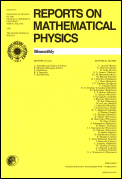
REPORTS ON MATHEMATICAL PHYSICS
Scope & Guideline
Unveiling Complexities in Mathematical Physics
Introduction
Aims and Scopes
- Mathematical Foundations of Physics:
Exploration of the mathematical structures underpinning physical theories, including quantum mechanics, general relativity, and statistical mechanics. - Quantum Mechanics and Quantum Information:
Research on quantum systems, quantum entanglement, and quantum information theory, including applications in quantum computing and cryptography. - Nonlinear Dynamics and Solitons:
Investigation of nonlinear phenomena, soliton solutions, and integrable systems across various physical contexts, including fluid dynamics and field theories. - Statistical Mechanics and Thermodynamics:
Studies on Gibbs measures, phase transitions, and statistical properties of physical systems, often employing mathematical rigor to derive new insights. - Geometric and Algebraic Methods:
Utilization of geometric and algebraic techniques in understanding physical systems, particularly in the context of gauge theories and symmetries. - Mathematical Models in Cosmology and General Relativity:
Application of mathematical techniques to solve problems in cosmology and the study of spacetime geometries in general relativity.
Trending and Emerging
- Quantum Computing and Quantum Information Theory:
There is a notable increase in research related to quantum computing, including studies on quantum codes and entangled states, reflecting the rapid developments in this field. - Nonlocal and Fractional Differential Equations:
An emerging focus on nonlocal and fractional differential equations indicates a growing interest in complex systems and their mathematical modeling, particularly in physical contexts. - Geometric Analysis in Physics:
Research on geometric methods applied to physical theories, particularly in the context of quantum gravity and gauge theories, is increasingly prominent in current publications. - Mathematical Models in Complex Systems:
There is a rising trend in studies that apply mathematical modeling to complex systems, including multi-species stochastic models and dynamics of entangled states, showcasing interdisciplinary approaches. - Advanced Topics in Statistical Mechanics:
A surge in papers addressing advanced topics within statistical mechanics, such as Gibbs measures and their applications in various contexts, illustrates a deeper exploration of this field.
Declining or Waning
- Classical Mechanics and Traditional Dynamics:
Research on classical mechanics has become less frequent as the journal's scope shifts towards more modern and complex theories, such as quantum mechanics and nonlinear dynamics. - Elementary Particle Physics:
Papers specifically dedicated to elementary particle physics are decreasing, possibly due to a growing emphasis on mathematical frameworks and less on specific particle models. - Basic Thermodynamics:
The exploration of fundamental thermodynamic principles appears to be waning, as the journal increasingly prioritizes advanced statistical mechanics and non-equilibrium thermodynamics.
Similar Journals
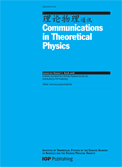
COMMUNICATIONS IN THEORETICAL PHYSICS
Illuminating the pathways of theoretical inquiry.COMMUNICATIONS IN THEORETICAL PHYSICS is a distinguished journal published by IOP Publishing Ltd, focusing on the broad and evolving field of theoretical physics. With an ISSN of 0253-6102 and an E-ISSN of 1572-9494, this journal provides a platform for the dissemination of innovative research that contributes to the understanding of complex physical concepts. Situated in the United Kingdom, it has established itself as a pivotal resource from 1996 to 2024, achieving a commendable Q2 ranking in the category of Physics and Astronomy (miscellaneous) for 2023. With a Scopus ranking of #18 out of 81 in its category, demonstrating a 78th percentile, this journal plays a crucial role in enhancing scholarly communication among researchers, professionals, and students alike. Although it does not currently offer Open Access options, the journal's comprehensive scope and commitment to high-quality peer-reviewed research underline its significance in the scientific community, making it an essential reading for anyone engaged in theoretical physics.

Physics
Innovating Knowledge: Your Gateway to Physics DiscoveriesPhysics, published by MDPI, is an open-access journal that commenced in 2019 and has quickly established itself as a significant contributor to the field of physics and astronomy. With a respectable impact factor and categorized in the Q2 quartile for 2023, this journal serves a broad spectrum of topics within the discipline, fostering innovative research and insights. As part of the MDPI portfolio, known for promoting high-quality, peer-reviewed research, Physics aims to provide a platform for scholars, professionals, and students to publish their findings and engage with contemporary debates in the field. The journal's accessibility, paired with its commitment to scientific excellence, ensures that research is readily available to a global audience, which is crucial for advancing knowledge and collaboration in physics. Located in the heart of Switzerland at ST ALBAN-ANLAGE 66, CH-4052 BASEL, the journal enjoys a position at the nexus of cutting-edge research and academia.

INTERNATIONAL JOURNAL OF MODERN PHYSICS A
Elevating research standards in contemporary physics.INTERNATIONAL JOURNAL OF MODERN PHYSICS A, published by WORLD SCIENTIFIC PUBL CO PTE LTD, stands as a pivotal platform in advancing the frontiers of research within the fields of Astronomy and Astrophysics, Atomic and Molecular Physics, and Nuclear and High Energy Physics. Established in 1989, this journal has systematically contributed to the scientific community, with a demonstrated impact as indicated by its Q2 category rankings across these critical disciplines in 2023. Researchers and professionals are encouraged to engage with its rigorous peer-reviewed content, fostering a deeper understanding of modern physics theories and experimental breakthroughs. Although the journal operates under a conventional access model, it remains a vital resource for those seeking to disseminate their findings and stay abreast of cutting-edge developments. With an emphasis on quality and breadth of research, the journal continues to attract submissions from leading physicists and scholars, enhancing its reputation as a key academic resource.
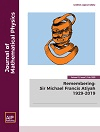
JOURNAL OF MATHEMATICAL PHYSICS
Charting new territories in theoretical physics and mathematics.Welcome to the JOURNAL OF MATHEMATICAL PHYSICS, a distinguished publication dedicated to the burgeoning fields of mathematical physics and statistical and nonlinear physics, published by AIP Publishing. Established in 1960, the journal continually showcases cutting-edge research and theoretical advancements that drive the understanding of complex systems and mathematical formulations within physics. With an impressive Scopus ranking of #38 in Mathematical Physics and #39 in Statistical and Nonlinear Physics, the journal is recognized for its vital contributions to the academic community, achieving a solid Q2 quartile ranking in both categories for 2023. While not an open-access journal, it remains a critical resource for researchers, professionals, and graduate students seeking insights into rigorous mathematical methods and their applications in physical sciences. Engage with the finest research as we converge toward new frontiers from 1960 to 2024, fostering academic collaboration and innovation.

TAIWANESE JOURNAL OF MATHEMATICS
Exploring new horizons in mathematical thought and application.TAIWANESE JOURNAL OF MATHEMATICS, published by the Mathematical Society of the Republic of China, is a pivotal platform for disseminating innovative research in the field of mathematics. Established in 1997 and currently encompassing works until 2024, this journal aims to foster a global dialogue among mathematicians, researchers, professionals, and students interested in diverse mathematical topics, including theoretical and applied concepts. The journal, which holds a respectable Q2 ranking in Mathematics (miscellaneous) for 2023, is acknowledged for its commitment to quality and scholarly excellence, also being listed in Scopus with a rank of #234 out of 399 in General Mathematics, positioning it in the 41st percentile among its peers. By providing unrestricted access to its research outputs, TAIWANESE JOURNAL OF MATHEMATICS ensures that vital findings are available to a broad audience, thus contributing significantly to the advancement of mathematical sciences both in Taiwan and globally.

COMMUNICATIONS IN MATHEMATICAL PHYSICS
Illuminating Paths in the Landscape of Physics ResearchCOMMUNICATIONS IN MATHEMATICAL PHYSICS is a premier journal in the realm of mathematical physics, published by Springer and recognized for its rigorous scholarship and comprehensive coverage of the field since its inception in 1965. With an impressive impact factor reflecting its influential contributions—ranking Q1 in both Mathematical Physics and Statistical and Nonlinear Physics—the journal consistently attracts high-quality submissions. It holds notable standings in Scopus, ranked 11th in Mathematical Physics and 12th in Statistical and Nonlinear Physics, marking it as a critical venue for both emerging and established researchers. The journal is dedicated to the dissemination of groundbreaking research and reviews, thereby fostering dialogue and innovation in a constantly evolving discipline. It provides invaluable access to cutting-edge theoretical advancements, making it an essential resource for professionals and students alike engaged in this dynamic field of study.
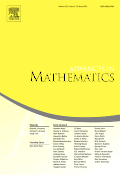
ADVANCES IN MATHEMATICS
Innovating the Landscape of Mathematical SciencesADVANCES IN MATHEMATICS, published by Academic Press Inc. Elsevier Science, is a premier journal in the field of mathematics, with its ISSN 0001-8708 and E-ISSN 1090-2082. Renowned for its rigorous peer-reviewed research, this journal serves as a platform for disseminating cutting-edge advancements and innovative approaches across all branches of mathematics. With an impressive Q1 category ranking in Mathematics (miscellaneous) and a Scopus rank of 74/399 placing it in the 81st percentile, it is considered a vital resource for researchers and professionals seeking to stay abreast of emerging trends and developments. Although it is not currently an open access publication, ADVANCES IN MATHEMATICS remains committed to publishing high-quality articles that elevate the field and foster scholarly communication. Established in 1961 and continuously influential in advancing mathematical sciences, this journal is crucial for anyone deeply engaged in mathematical research.

Symmetry Integrability and Geometry-Methods and Applications
Unlocking the Secrets of Geometry and IntegrabilitySymmetry Integrability and Geometry-Methods and Applications is a prominent open-access journal published by the NATIONAL ACADEMY OF SCIENCES OF UKRAINE, INSTITUTE OF MATHEMATICS, dedicated to advancing research in the fields of Analysis, Geometry and Topology, and Mathematical Physics. Since its inception in 2005, the journal has provided an esteemed platform for scholars from around the globe to share their innovative findings and methodologies, contributing to our understanding of complex mathematical concepts. With an impressive Q2 ranking in all three mathematical categories as per the 2023 Scopus rankings, the journal positions itself as a key resource for researchers seeking high-quality, peer-reviewed content. As a fully open-access publication, it ensures that research is readily available to a wide audience, fostering collaboration and knowledge exchange in the mathematical sciences.
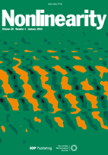
NONLINEARITY
Shaping the Future of Mathematical PhysicsNONLINEARITY is a premier academic journal published by IOP Publishing Ltd, dedicated to advancing the field of complex systems through the lens of nonlinear science. Since its inception in 1988, the journal has established itself as a vital resource for researchers and professionals alike, offering a robust platform for disseminating high-quality research in areas such as applied mathematics, mathematical physics, and statistical and nonlinear physics. With an impressive Q1 ranking across multiple pertinent categories, including Applied Mathematics and Mathematical Physics, NONLINEARITY ranks among the top journals globally, making it essential reading for those seeking to deepen their understanding of nonlinear phenomena. Although it does not operate under an open-access model, its rich repository of rigorous articles significantly contributes to academia, fostering innovative thought and facilitating cutting-edge research. Located in the heart of the United Kingdom at TEMPLE CIRCUS, TEMPLE WAY, BRISTOL BS1 6BE, NONLINEARITY continues to be at the forefront of the scientific community, championing new discoveries and interdisciplinary dialogue within its dynamic scope.
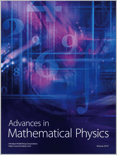
Advances in Mathematical Physics
Advancing Knowledge through Open AccessAdvances in Mathematical Physics is a premier open-access journal published by HINDAWI LTD, dedicated to the dissemination of research in the fields of applied mathematics and physics. With its ISSN 1687-9120 and E-ISSN 1687-9139, this journal has been a vital platform for innovative studies since its inception in 2009, fostering a collaborative environment for researchers and professionals alike. The journal features a wide range of topics, including but not limited to mathematical models, computational physics, and interdisciplinary applications, thus attracting a diverse readership. Ranked in the Q3 quartile for both Applied Mathematics and Physics and Astronomy, it serves as a significant resource for academics looking to explore cutting-edge developments and theoretical advancements. With an emphasis on open accessibility, Advances in Mathematical Physics ensures that research findings are readily available to the global academic community, leveling the playing field for emerging scholars and seasoned researchers. By consistently showcasing high-quality manuscripts, the journal contributes substantially to the fields of mathematics and physics, encouraging scholarly dialogue and advancing knowledge across a myriad of applications.